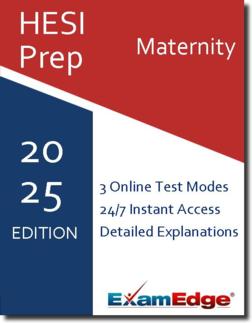HESI Maternity (Maternity) Practice Tests & Test Prep by Exam Edge - Additional Information
Based on 29 Reviews
- Real Exam Simulation: Timed questions and matching content build comfort for your HESI Maternity test day.
- Instant, 24/7 Access: Web-based HESI Maternity practice exams with no software needed.
- Clear Explanations: Step-by-step answers and explanations for your HESI exam to strengthen understanding.
- Boosted Confidence: Reduces anxiety and improves test-taking skills to ace your HESI Maternity (Maternity).

HESI Maternity - Additional Information
What is the HESI Maternity Exam?
The Maternity HESI exam is a timed standardized exam developed by Elsevier to measure a nursing student's knowledge of maternity nursing. The HESI Maternity exam test is administered by nursing programs, and is an excellent predictor of how well nursing students will score on the NCLEX exam— the national test for nurse licensure.
What is the HESI Maternity like? What to Expect?
The HESI Maternity exam features multiple-choice questions and covers a variety of topics related to pregnancy, labor, birth, postpartum, lactations support, and newborn care. It differs from other nursing exams because the Maternity HESI exam tests specialty knowledge rather than overall nursing skills and expertise. The HESI Maternity exam is not an entrance or exit exam— it's taken after relevant coursework in obstetrics and maternity nursing is completed.
With Exam Edge's HESI maternity test bank, you will be poised to succeed in the healthcare industry. Register for the HESI Maternity Exam on the Elsevier website, and learn more about other HESI specialty exams today.
Why is Taking the HESI Maternity Test Important?
The Maternity HESI is important because it serves as an indicator of how well you will perform on your NCLEX, a crucial exam to becoming a licensed registered maternity nurse. As a maternity nurse, you will have one of the most important jobs in our world today. It is essential to prepare for the next step in your nursing career with the Maternity HESI practice test.
Nursing is a noble career, and maternity nursing is a true calling. You will be called upon to support patients as they experience a monumental life change. Studying early and being prepared is the surest path toward knowing how to pass the Maternity HESI.
How to Prepare for the HESI Maternity Exam?
According to this study done at the Federation University Australia, an individual's grit is a metric that can be used to understand why some nursing students outperform their peers. This intrinsic characteristic is defined by perseverance in the face of adversity and a passionate focus on the long-term. The study suggests that consistent academic and clinical practice was a driving force in helping these students persevere. Put your grit into action by preparing for your career with Exam Edge's Maternity HESI exam quizlet.
Practice testing is a great way to avoid test-taking anxiety. When you know what to expect on your Maternity HESI, you feel calmer and more confident on the test day. Our HESI Maternity practice exams mimic the feel of the real exam with 100 unique questions across 10 different practice tests.
Developing solid study habits is a key component of your long-term career success. Spaced practice, or spreading out study sessions over a long period of time, has been proven effective, especially when combined with practice tests. Our Maternity HESI test provides the perfect platform to learn and challenge yourself ahead of the real deal.
While standardized tests can be daunting for many people, nursing students can gain the knowledge and confidence they need by utilizing HESI Maternity practice exams. Experiment with timed and untimed practice tests and get detailed explanations for each question. Let Exam Edge's HESI Maternity practice exam help you take the next step toward your passion: a successful career as a maternity nurse!


